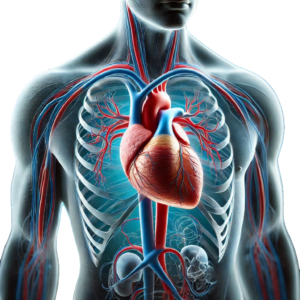This Course Structure is Curated as per the NEP-2020 Guidelines
Course Overview
B.Sc. Cardiovascular Technology (Cath Lab) program at Malla Reddy Vishwavidyapeeth, Hyderabad, is an undergraduate program designed to train students to assist cardiologists during cardiac diagnostic and interventional procedures in cardiac catheterization laboratories (Cath Labs).
This program focuses on equipping students with the theoretical knowledge and hands-on skills from 1st semester itself. The curriculum integrates an in-depth understanding of cardiovascular anatomy, hemodynamic monitoring, and the operation of advanced equipment used in angiography, angioplasty, and other interventional procedures. Students are trained to assist in catheterization techniques, cardiac imaging, and emergency response during critical cardiac events. With practical exposure to modern Cath Labs, students gain expertise in assisting cardiologists in diagnostic and therapeutic procedures, managing equipment, and analysing diagnostic data.
Graduates of this program emerge as ‘skilled Cardiovascular Technologists’, enabling them to pursue further higher studies & do research in Cardiovascular Technology along with plenty of job opportunities globally.

Course Details
Description: 4 Years Degree Program
No. of Seats: 40
No. of Credits: 160 minimum & as specified
- Eligibility
- Curriculum Structure
- Program Outcomes
- Career Enhancement
- Higher Studies
- Job Roles & Progression
The minimum eligibility for B.Sc. Cardiovascular Technology (Cath Lab) is a pass in 10+2 with at least 50% in Physics, Chemistry and Biology from a recognized board (CBSE/ISC) or equivalent.
| Semester | Name of the Subject |
| Semester 1 | Anatomy – I Physiology – I Biochemistry – I Introduction to Cardiovascular Technology Practical: Cardiovascular Anatomy English & Communication Skills Computer Applications |
| Semester 2 | Anatomy – II Physiology – II Pathology and Microbiology Basic Cardiovascular Procedures Practical: Basic Cardiovascular Techniques |
| Semester 3 | Advanced Cardiovascular Physiology Pharmacology in Cardiovascular Medicine Hemodynamic Monitoring – I Diagnostic Cardiology Procedures Practical: Diagnostic Techniques in Cardiology |
| Semester 4 | Interventional Cardiology – I Cardiovascular Imaging Techniques Research Methodology and Biostatistics Hemodynamic Monitoring – II Practical: Interventional and Imaging Techniques |
| Semester 5 | Interventional Cardiology – II Emergency Management in Cardiology Quality Assurance in Cath Lab Patient Care in Cardiovascular Settings Practical: Advanced Cath Lab Techniques |
| Semester 6 | Pediatric Cardiology Electrophysiology in Cardiology Advances in Cardiovascular Technology Practical: Pediatric and Electrophysiology Procedures |
| Semester 7 | Internship in Cath Lab Procedures Clinical Case Studies Practical: On-Job Training in Cath Lab |
| Semester 8 | Advanced Internship Thesis/Research Project Entrepreneurship in Cardiovascular Technology Practical: Clinical Operations in Cath Lab |
- Hemodynamic Monitoring Expertise: Skills in analyzing and interpreting hemodynamic parameters during procedures.
- Cath Lab Operations: Proficiency in assisting with interventional procedures like angioplasty and stent placement.
- Advanced Imaging Techniques: Knowledge of echocardiography, fluoroscopy, and other cardiovascular imaging methods.
- Emergency Management: Competence in handling cardiac emergencies such as myocardial infarction and arrhythmias.
- Pediatric and Electrophysiology Techniques: Expertise in managing pediatric cardiac cases and electrophysiology procedures.
- Patient Care and Communication: Skills in managing pre-procedure and post-procedure patient care.
- Certification in Interventional Cardiology: Specialized training in cath lab procedures such as angioplasty and stent placement.
- Advanced Imaging Certification: Focuses on echocardiography, CT angiography, and MRI in cardiology.
- Hemodynamic Monitoring Certification: Covers advanced techniques in monitoring cardiovascular functions.
- Emergency Cardiovascular Care Certification: Training in managing cardiac emergencies and critical care scenarios.
- Pediatric Cardiology Certification: Specialized knowledge in managing congenital and pediatric cardiac conditions.
- M.Sc. in Cardiovascular Technology or Interventional Cardiology
- Postgraduate Diploma in Cardiac Imaging
- Master’s in Cardiac Rehabilitation
- Ph.D. in Cardiovascular Science
| Duration | Roles and Responsibilities | Salary Range |
| 0-3 years | Cath Lab Technician, Cardiovascular Technologist | ₹5,00,000 – ₹7,00,000 per annum |
| 3-5 years | Senior Cath Lab Technologist, Cardiac Imaging Specialist | ₹7,00,000 – ₹10,00,000 per annum |
| 5-10 years | Cardiac Electrophysiology Specialist, Cath Lab Manager | ₹10,00,000 – ₹15,00,000 per annum |
| 10+ years | Chief Cardiovascular Technologist, Consultant in Cardiovascular Technology | ₹15,00,000+ per annum |
Note: Salaries vary based on experience, location, and type of healthcare institution.

Fee Structure Per Academic Year - 2025
| Tuition Fee | Miscellaneous Fee | Scholarship | |||
| 160000 ₹ | 15000 ₹ | Above 95% – 160000 ₹ | Above 91% – 80000 ₹ | Between 81-90% – 16000 ₹ | Between 71-80% – 8000 ₹ |
| Tuition Fee | Miscellaneous Fee | Scholarship | ||
| 160000 ₹ | 10000 ₹ | Above 90% – 32000 ₹ | Between 80-90% – 16000 ₹ | Between 70-80% – 8000 ₹ |




